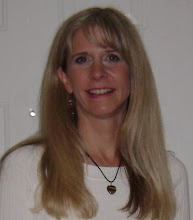There it stares--daunting and haunting.
It's bright. It's white. A bit of a fright.
It's not a ghost, and it's not lightning.
Although at times, it is quite frightening.
It lies on desks or lights a screen.
It often scares us and seems quite mean!
It's the dreaded...BLANK PAGE!!!
Perhaps one of the most difficult obstacles when beginning to write is getting started. I don't know how many times I've sat with a blank page as I checked email, Twitter, Facebook, email again...as though something magical would happen, that suddenly I'd be overtaken with vivid verse which would flow faster than I could fill a page.
As I've come to learn, creative writing is not an "on demand" activity. Writing creatively takes time and patience. It's the end result of something much greater than whipping out words on a whim. It comes from practice, and plenty of it. But in order to practice efficiently, there's something many writers must learn to let go--the urge to edit at every turn.
While editing is an important--and usually necessary--part of writing, it's best to avoid while composing drafts. Doing so would be comparable to taking a mile long jog, stopping every few minutes to walk backward a few hundred feet, then restarting. Not only would it take much longer to make the goal, it would disrupt the flow of the exercise and probably create frustration.
How does a writer resist the urge to revise?
One method is to set a timer for a short amount of time, maybe fifteen minutes to start. With an idea in mind and blank page on hand, let the words go where they will, not stopping until time is up. It doesn't matter if it flows a in a direction other than originally imagined. The point is to just get words on paper (or screen). You can always return to work on details.
Another way to battle a blank page is by first creating an outline, then working on it one segment at a time. For a picture book writer this may entail writing two or three paragraphs, then revising. For a novelist, it may mean composing several pages (or even an entire chapter) before editing. The point is to break the project into smaller pieces, making the overall task more manageable.
A third option when taking on a blank page is to brainstorm the who, what, when, where, why and how of your story. This is especially useful when an overall idea is not fully formed. For example, if a writer is contemplating a manuscript about a child and her pet, it would be a good idea to create lists, descriptions and questions about any and every thing that could possibly relate to that type of story. (What type of pet? Pet's appearance? Child's relationship with pet? Setting? Conflict? Child's age? Temperament of pet/child?) The potential is endless.
So the next time you find yourself in a staring contest with the beast that never blinks, look it in the eye, round up your resources and write, write, write!
New Release Spotlight: Cara Putman
3 days ago

I love this post!!! You are so correct. I'm guilty right now! I'm suppose to be working on my manuscript and I'm on the web doing other things - although they are productive, my original task is often left undone. Now, I must go and WRITE!!!!!!!!!!!!!!!!!!!!!!!!
ReplyDeleteGreat post Lisa. Sorry I am so late in getting over here to read it.
ReplyDelete